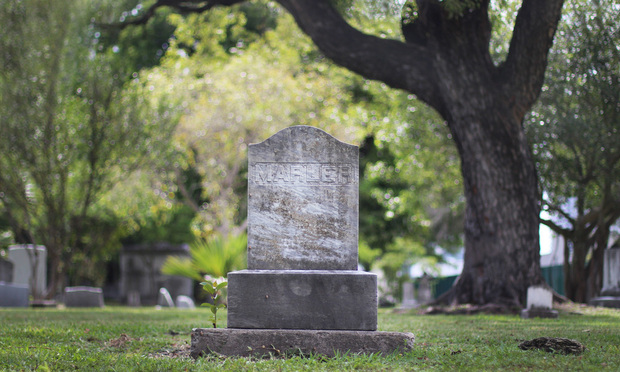SCOTUS to Hear Pa. Case of Private Property Turned Into Public Cemetery
The U.S. Supreme Court is set to hear the case of a Pennsylvania woman whose home, allegedly situated on an ancestral burial ground, was deemed public property by the local municipality.
March 07, 2018 at 06:55 PM
3 minute read

The U.S. Supreme Court is set to hear the case of a Pennsylvania woman whose home, allegedly situated on an ancestral burial ground, was deemed public property by the local municipality.
The court granted Rose Mary Knick's certiorari petition March 5, agreeing to weigh in on the constitutionality of the state-litigation requirement in takings cases, which bars property owners from filing takings claims in federal court until they exhaust state court remedies, derived from the 1985 high court ruling in Williamson County Regional Planning Commission v. Hamilton Bank of Johnson City.
Knick's troubles started when a nearby Lackawanna County family claimed their ancestors were interred under her property. Knick, a Scott Township resident, argued the family's claims were untrue, but a local ordinance says the township has the right to come to Knick's property to investigate. What started out as an isolated dispute then erupted into a full-blown federal court case over the constitutionality of the local cemetery law.
In November she asked the justices to vacate a July 5 ruling from the U.S. Court of Appeals for the Third Circuit upholding the dismissal of her constitutional claims.
James David Breemer, of the business-focused public interest law firm Pacific Legal Foundation in Sacramento, represents Knick.
“We are very pleased that the court is going to consider overruling the bizarre Williamson County rules that prevent property owners from having prompt and reasonable access to the courts when their land is invaded without compensation,” Breemer said March 6.
The township's lawyer, Thomas A. Specht of Marshall Dennehey Warner Coleman & Goggin's Scranton office, did not respond to a call seeking comment.
Knick claimed that the Scott Township ordinance requiring owners of private property with cemeteries on-site to open their grounds to the public violates the Constitution by permitting unrestrained searches of private property in violation of the Fourth Amendment, and that it takes private property without compensation, violating the Fifth Amendment.
But while the case presented potentially impactful constitutional questions, it was ultimately dismissed on procedural grounds by a federal judge in the Middle District of Pennsylvania, a decision upheld by the Third Circuit.
“The township's ordinance is extraordinary and constitutionally suspect,” Third Circuit Chief Judge D. Brooks Smith wrote in the court's July opinion. “However, important justiciability considerations preclude us from reaching the merits. Because Knick concedes that her Fourth Amendment rights were not violated and fails to demonstrate that they imminently will be, Knick lacks standing to advance her Fourth Amendment challenge.”
“And as the district court correctly held,” Smith continued, “Knick's Fifth Amendment claims are not ripe until she has sought and been denied just compensation using Pennsylvania's inverse-condemnation procedures.”
While Knick claimed the search of her property by a township official infringed on her rights, the district court held it was lawful. The court held that because the code enforcement officer inspected an open field and not Knick's house, no harm was done.
The question then, Smith said, turned to whether she could pursue the case even though her own rights were not violated.
This content has been archived. It is available through our partners, LexisNexis® and Bloomberg Law.
To view this content, please continue to their sites.
Not a Lexis Subscriber?
Subscribe Now
Not a Bloomberg Law Subscriber?
Subscribe Now
NOT FOR REPRINT
© 2025 ALM Global, LLC, All Rights Reserved. Request academic re-use from www.copyright.com. All other uses, submit a request to [email protected]. For more information visit Asset & Logo Licensing.
You Might Like
View All
Lackawanna County Lawyer Fails to Shake Legal Mal Claims Over Sex With Client
3 minute read
Pa. Superior Court Rules Pizza Chain Liable for Franchisee Driver's Crash
4 minute read
Patent Pending ... and Pending ... and Pending? Brace Yourself for Longer Waits
3 minute read
Boosting Litigation and Employee Benefits Practices, Two Am Law 100 Firms Grow in Pittsburgh
3 minute readTrending Stories
- 1Munger, Gibson Dunn Billed $63 Million to Snap in 2024
- 2January Petitions Press High Court on Guns, Birth Certificate Sex Classifications
- 3'A Waste of Your Time': Practice Tips From Judges in the Oakland Federal Courthouse
- 4Judge Extends Tom Girardi's Time in Prison Medical Facility to Feb. 20
- 5Supreme Court Denies Trump's Request to Pause Pending Environmental Cases
Who Got The Work
J. Brugh Lower of Gibbons has entered an appearance for industrial equipment supplier Devco Corporation in a pending trademark infringement lawsuit. The suit, accusing the defendant of selling knock-off Graco products, was filed Dec. 18 in New Jersey District Court by Rivkin Radler on behalf of Graco Inc. and Graco Minnesota. The case, assigned to U.S. District Judge Zahid N. Quraishi, is 3:24-cv-11294, Graco Inc. et al v. Devco Corporation.
Who Got The Work
Rebecca Maller-Stein and Kent A. Yalowitz of Arnold & Porter Kaye Scholer have entered their appearances for Hanaco Venture Capital and its executives, Lior Prosor and David Frankel, in a pending securities lawsuit. The action, filed on Dec. 24 in New York Southern District Court by Zell, Aron & Co. on behalf of Goldeneye Advisors, accuses the defendants of negligently and fraudulently managing the plaintiff's $1 million investment. The case, assigned to U.S. District Judge Vernon S. Broderick, is 1:24-cv-09918, Goldeneye Advisors, LLC v. Hanaco Venture Capital, Ltd. et al.
Who Got The Work
Attorneys from A&O Shearman has stepped in as defense counsel for Toronto-Dominion Bank and other defendants in a pending securities class action. The suit, filed Dec. 11 in New York Southern District Court by Bleichmar Fonti & Auld, accuses the defendants of concealing the bank's 'pervasive' deficiencies in regards to its compliance with the Bank Secrecy Act and the quality of its anti-money laundering controls. The case, assigned to U.S. District Judge Arun Subramanian, is 1:24-cv-09445, Gonzalez v. The Toronto-Dominion Bank et al.
Who Got The Work
Crown Castle International, a Pennsylvania company providing shared communications infrastructure, has turned to Luke D. Wolf of Gordon Rees Scully Mansukhani to fend off a pending breach-of-contract lawsuit. The court action, filed Nov. 25 in Michigan Eastern District Court by Hooper Hathaway PC on behalf of The Town Residences LLC, accuses Crown Castle of failing to transfer approximately $30,000 in utility payments from T-Mobile in breach of a roof-top lease and assignment agreement. The case, assigned to U.S. District Judge Susan K. Declercq, is 2:24-cv-13131, The Town Residences LLC v. T-Mobile US, Inc. et al.
Who Got The Work
Wilfred P. Coronato and Daniel M. Schwartz of McCarter & English have stepped in as defense counsel to Electrolux Home Products Inc. in a pending product liability lawsuit. The court action, filed Nov. 26 in New York Eastern District Court by Poulos Lopiccolo PC and Nagel Rice LLP on behalf of David Stern, alleges that the defendant's refrigerators’ drawers and shelving repeatedly break and fall apart within months after purchase. The case, assigned to U.S. District Judge Joan M. Azrack, is 2:24-cv-08204, Stern v. Electrolux Home Products, Inc.
Featured Firms
Law Offices of Gary Martin Hays & Associates, P.C.
(470) 294-1674
Law Offices of Mark E. Salomone
(857) 444-6468
Smith & Hassler
(713) 739-1250





